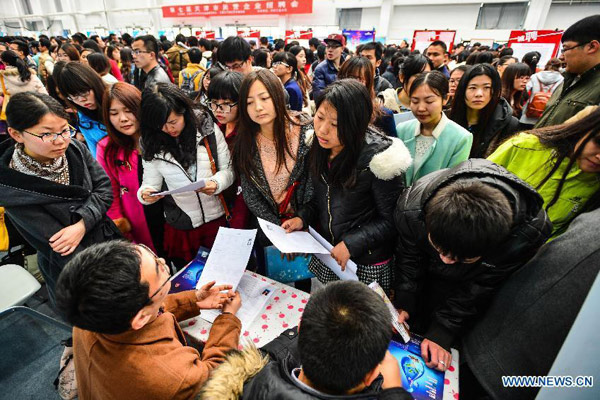
Job seekers consult recruiters about job information at a job fair held for fresh graduates in North China's Tianjin municipality, March 14, 2015. About 1,800 opportunities were offered at the fair. [You Sixing /Xinhua]
First-tier cities appear to have become less glamorous for university graduates facing pressure to find jobs this year.
A record number of students graduated from college amid China's economic slowdown, making the job-hunting season one of the toughest in history
College graduates reached a record high of 7.49 million, up 220,000 compared with 2014, according to the Ministry of Human Resources and Social Security.
Meanwhile, sagging economic growth means companies have generally decreased demand for new recruits.
According to Tsinghua University, more than 50 percent of its graduates chose to find jobs outside Beijing in the past three years and the number is set to rise again.
A survey by an organization in association with the Youth League Committee of Beijing said 48.8 percent of respondents hope to work in second-tier cities, such as provincial capitals.
The survey collected answers from 15,000 questionnaires filled out by college students across the country.
In Shanghai, local educational authorities said more than 20 percent of non-Shanghai graduates are expected to leave for employment.
Li Xiao, a graduate from Beijing-based Capital Normal University told China News Service that staying in Beijing means huge life pressures, the first of which is hukou ?household registration system?.
Only two of her nine non-Beijing classmates managed to find jobs with hukou, Li said and she decided to return to her hometown of Zhengzhou in Central Henan province.
Soaring housing prices are another major factor behind the student exodus.
The average housing price in Beijing reached 29,222 yuan ($4,707) per square meter in the first half of this year.
In contrast, the expected monthly salary of college graduates is 5,510 yuan, up 1,830 yuan from last year, according to the survey.